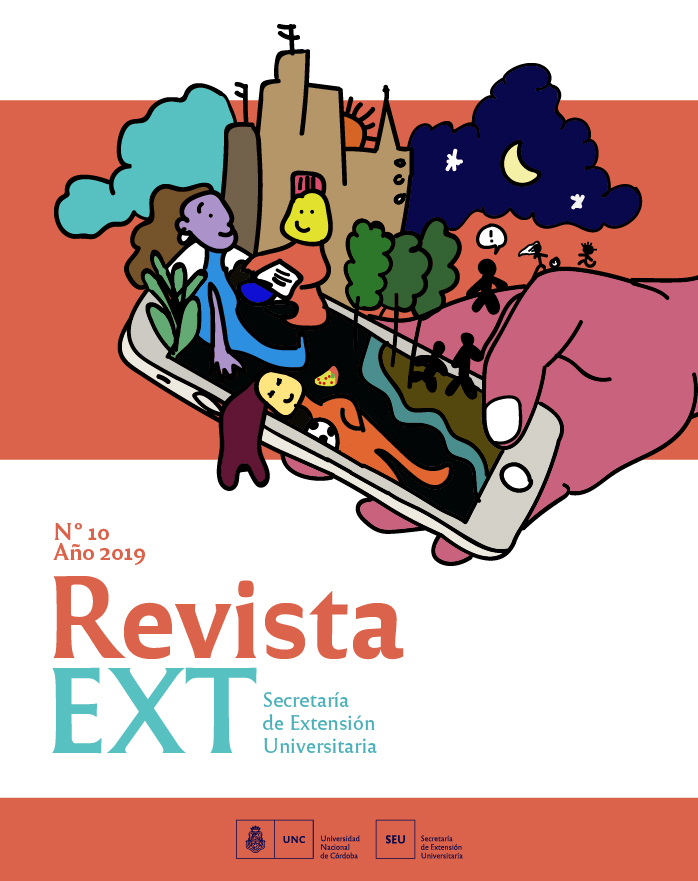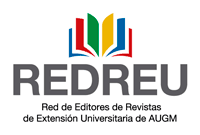Voices of the CENMA: "An experience of university extension"
Keywords:
outreach; educational trajectories; university volunteer program; higher educationAbstract
This work seeks to describe the outreach experience shared by high school and university students within the framework of the "Construyendo Trayectorias" Project (Creating Trajectories), financed by the Secretaria de Politicas Universitarias (University Policy Secretariat) as part of the university volunteer program, called "Compromiso Social Universitario" (University Social Commitment), and organized in conjunction with the Programa Compromiso Social Estudiantil (Student Social Commitment Program) from the Universidad Nacional de Córdoba (UNC) (Córdoba National University), which is developed to better the training of UNC students by allowing them to get involved in actions, tasks or projects related to university outreach consisting of socially relevant actions.
During the 2018 school year, the magazine "Voces de los CENMA" (Voices from CENMA) was produced with 1st and 3rd year students from three institutions belonging to the category Centro Educativo de Nivel Medio para Adultos (CENMA is the acronym in Spanish) (High School Level Education Center for Adults), in the capital city of Córdoba: CENMA SALUD, CENMA Nº 135 and CENMA Periféricos de Argüello, anexo Villa Cornú. The objective of the project was to gather students’ opinions and to learn about their interests and projects at the end of high school, while also giving them an opportunity to recount their experiences throughout the project.
This process allowed us to reflect on the importance of both training students who are committed to their social reality and promoting their active participation in joint work together with other students, something which strengthens the training and the educational trajectories of not only university students but also high school students.
Downloads
References
García del Compare, M. (2009). Formación de orientadores en Argentina: la incorporación de las tecnologías a las prácticas orientadoras. Revista de actualidad psicopedagógica. Aprendizaje hoy, N° 73. Buenos Aires. Argentina.
Lezcano-Calderón, S. (2014) La sistematización de experiencias en la extensión universitaria y en el fortalecimiento de la relación universidad y sociedad. Revista Universidad en Diálogo. Vol. IV, Nº1; 81-91.Universidad Nacional de Costa Rica.
Ley de Educación Nacional Nº 26.206/2006. Ministerio de Educación de la Nación. Argentina. 14 de diciembre de 2006.
Ley de Educación Provincial Nº 9870/2010. Legislatura de la Provincia de Córdoba. Argentina. 15 de diciembre de 2010.
Ordenanza HCS 4/2016. Programa Compromiso Social Estudiantil. Digesto Universidad Nacional de Córdoba. Argentina. 9 de agosto de 2016.
Pacheco, M. (2004) Reflexiones en torno a la construcción del espacio de la extensión universitaria hoy. Cuadernos de Educación. Vol. 3 (3), 21-30. Centro de Investigaciones María Saleme de Burnichon. Facultad de Filosofía y Humanidades. Universidad Nacional de Córdoba.
Resolución Rectoral UNC 2551/2016. Programa Compromiso Social Estudiantil. Digesto UNC. Universidad Nacional de Córdoba. Argentina. 28 de diciembre de 2016.
Yuni. J., Urbano, C. (2005) Mapas y herramientas para conocer la escuela: Investigación etnográfica. Investigación - acción. Ed. Brujas. Córdoba. Argentina.
Downloads
Published
Issue
Section
License
Aquellos autores/as que tengan publicaciones con esta revista, aceptan los términos siguientes:
- Los autores/as conservarán sus derechos de autor y garantizarán a la revista el derecho de primera publicación de su obra, el cuál estará simultáneamente sujeto a la Licencia de reconocimiento de Creative Commons que permite a terceros compartir la obra siempre que se indique su autor y su primera publicación esta revista.
- Los autores/as podrán adoptar otros acuerdos de licencia no exclusiva de distribución de la versión de la obra publicada (p. ej.: depositarla en un archivo telemático institucional o publicarla en un volumen monográfico) siempre que se indique la publicación inicial en esta revista.
- Se permite y recomienda a los autores/as difundir su obra a través de Internet (p. ej.: en archivos telemáticos institucionales o en su página web) después del proceso de publicación, lo cual puede producir intercambios interesantes y aumentar las citas de la obra publicada. (Véase El efecto del acceso abierto).





